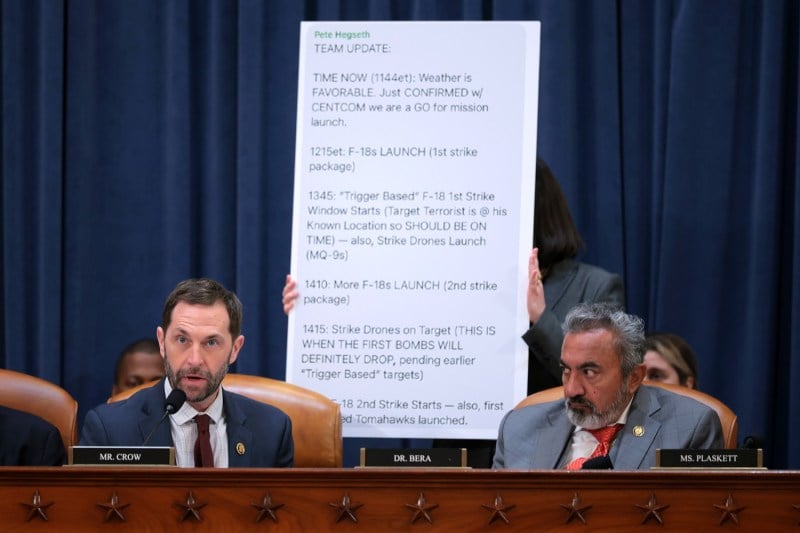Signalgate Crisis Deepens With More Messages Revealed

Signalgate Crisis Deepens With More Messages Revealed
The White House continues to downplay the incident even after the Atlantic publishes the full text conversation.
U.S. Rep. Jason Crow speaks in front of text messages by Defense Secretary Pete Hegseth during a House Intelligence Committee hearing in Washington on March 26. Kayla Bartkowski/Getty Images
On Wednesday, Director of National Intelligence Tulsi Gabbard and CIA Director John Ratcliffe testified before the House Intelligence Committee to discuss their participation in a Signal group chat that appears to have accidentally leaked highly sensitive information about an impending U.S. military strike in Yemen. The scandal, dubbed “Signalgate,” continues to roil Washington as the White House tries to explain how top officials in the Trump administration ended up carrying out one of the most serious breaches of U.S. national security in recent memory.
On Monday, the Atlantic revealed that U.S. National Security Advisor Mike Waltz accidentally included magazine editor in chief Jeffrey Goldberg on a text chain discussing planned military strikes against Houthi rebels in Yemen. More than a dozen other high-ranking officials were also in the group chat, including Gabbard and Ratcliffe as well as Vice President J.D. Vance, Secretary of State Marco Rubio, Defense Secretary Pete Hegseth, Treasury Secretary Scott Bessent, and White House special envoy Steve Witkoff.
On Wednesday, Director of National Intelligence Tulsi Gabbard and CIA Director John Ratcliffe testified before the House Intelligence Committee to discuss their participation in a Signal group chat that appears to have accidentally leaked highly sensitive information about an impending U.S. military strike in Yemen. The scandal, dubbed “Signalgate,” continues to roil Washington as the White House tries to explain how top officials in the Trump administration ended up carrying out one of the most serious breaches of U.S. national security in recent memory.
On Monday, the Atlantic revealed that U.S. National Security Advisor Mike Waltz accidentally included magazine editor in chief Jeffrey Goldberg on a text chain discussing planned military strikes against Houthi rebels in Yemen. More than a dozen other high-ranking officials were also in the group chat, including Gabbard and Ratcliffe as well as Vice President J.D. Vance, Secretary of State Marco Rubio, Defense Secretary Pete Hegseth, Treasury Secretary Scott Bessent, and White House special envoy Steve Witkoff.
Out of concern for national security, Goldberg deliberately left out of his initial report part of the conversation, in which Hegseth had shared what Goldberg described as “operational details of forthcoming strikes on Yemen, including information about targets, weapons the U.S. would be deploying, and attack sequencing.” However, after Gabbard and Ratcliffe testified under oath before the Senate Intelligence Committee on Tuesday that no classified information had been included in the chat, Goldberg on Wednesday published the full contents of the chat that he was part of.
“TIME NOW (1144et): Weather is FAVORABLE. Just CONFIRMED w/CENTCOM we are a GO for mission launch,” Hegseth texted in the group on March 15, ahead of the military operation that killed at least 53 people in Yemen.
Read more in today’s World Brief: Signalgate Triggers Calls for Trump Cabinet Resignations.
This post is part of FP’s ongoing coverage of the Trump administration. Follow along here.
Alexandra Sharp is the World Brief writer at Foreign Policy. X: @AlexandraSSharp
Rishi Iyengar is a reporter at Foreign Policy. X: @Iyengarish
More from Foreign Policy
-

Zelensky stands before four Ukrainian flags; cameras are pointed at him. It’s Time for Ukraine to Accept an Ugly Peace
Seven things for Zelensky to keep in mind as cease-fire negotiations start.
-

Then-presidential candidate Donald Trump speaks before a capacity crowd at a rally for his campaign on April 10, 2016 in Rochester, New York. Trump Is Not a Revolutionary
Not all political upheaval is created equal.
-

German soldiers unload the U.S.-made MIM-104 Patriot surface-to-air missile system in Jasionka, Poland. The Latest Russian Missile Is Bad News for NATO
Oreshnik is a different beast from its predecessors.
-

French Emperor Napoleon Bonaparte leads the final assault by the Imperial Guard before his defeat at the Battle of Waterloo in what is today Belgium, on June 18, 1815. The Cost of Ignoring Geopolitics
Like Napoleon and the Ming dynasty, Europe is paying the price for strategic blindness.








Join the Conversation
Commenting on this and other recent articles is just one benefit of a Foreign Policy subscription.
Already a subscriber?
.
Subscribe
Subscribe
View Comments
Join the Conversation
Join the conversation on this and other recent Foreign Policy articles when you subscribe now.
Subscribe
Subscribe
Not your account?
View Comments
Join the Conversation
Please follow our comment guidelines, stay on topic, and be civil, courteous, and respectful of others’ beliefs.
Change your username |
Log out
Change your username:
CANCEL
Confirm your username to get started.
The default username below has been generated using the first name and last initial on your FP subscriber account. Usernames may be updated at any time and must not contain inappropriate or offensive language.